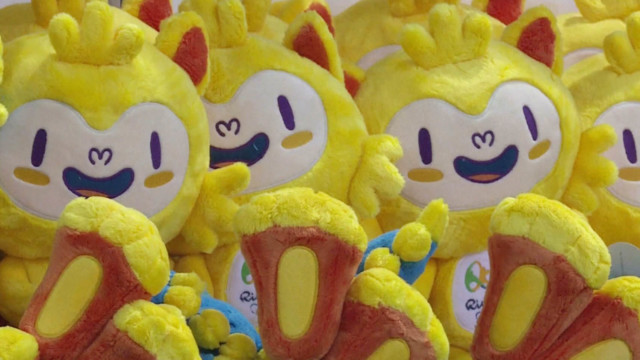Trade cooperation between China and Brazil is more visible than ever, thanks to the Summer Olympic Games.
Brazil’s biggest trade partner is not only seen in Rio’s fan apparel, but also in crucial infrastructure projects, ranging from trains to ferries.
CCTV America’s Lucrecia Franco reports.
Follow Lucrecia C. Franco on Twitter @LucreciaFranco

Trade cooperation between Brazil and China in summer Olympic Games
Trade cooperation between China and Brazil is more visible than ever, thanks to the Summer Olympic Games. Brazil’s biggest trade partner is not only seen in Rio’s fan apparel, but also in crucial infrastructure projects, ranging from trains to ferries. CCTV America’s Lucrecia Franco reports.Olympic souvenirs are already one of the biggest selling attractions at Rio’s official Olympic shops and most have been made in China, including the Rio 2016 mascots, Tom and Vinicius.
Uta Schwietzer, vice-president of the Brazil-China Chamber of Commerce, says China’s Olympic experience has boosted exports for the Rio games.
“You can see many products not only from the infrastructure and equipment but also clothing for the volunteers, almost one hundred thousand pieces, the stuffed animals, the official pins. All come from China,” she said.
A crucial subway extension for the games, Line 4, is using trains produced by Changchun Railway Vehicles in China’s Jilin province. The trains will carry fans from the touristy neighbors of Ipanema to Barra da Tijuca, the home of the Olympic park.
Other Chinese companies are also involved in the games, such as Afai Southern Shipyard that manufactured the new ferries that link the dormitory town of Niteroi to Rio, across the famous Guanabara Bay.
There is also the famous Maracana Stadium, host of the opening and closing ceremony of the Games and some of the Olympic football matches. It has more than 1,500 solar panels produced by China’s Yingli Solar – one of the world’s largest solar panel manufacturers.
The long list also includes air conditioners in Rio’s Olympic venues made by Midea, who won the bid for the cooling systems for the games.
Despite Brazil’s recession, China continues to be Brazil’s main trading partner, with overall trade valued at more than $66 billion in 2015. For these Olympics, investments in the host city are already paying off.
 CGTN America
CGTN America
